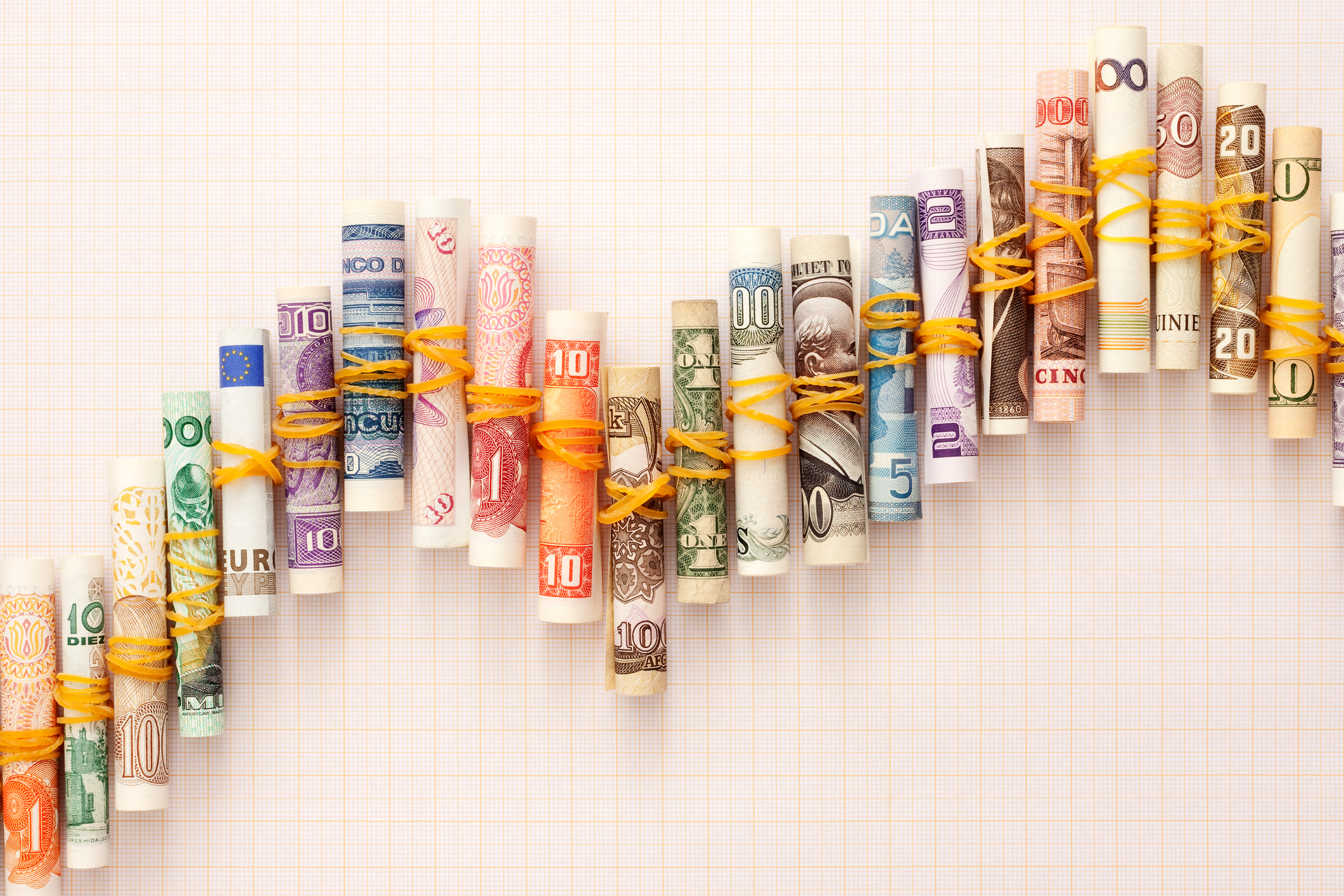Why strong currency is the key to upward mobility
Change your social status and your life by saving money in strong currencies, says Dominic Frisby


Get the latest financial news, insights and expert analysis from our award-winning MoneyWeek team, to help you understand what really matters when it comes to your finances.
You are now subscribed
Your newsletter sign-up was successful
Want to add more newsletters?

Twice daily
MoneyWeek
Get the latest financial news, insights and expert analysis from our award-winning MoneyWeek team, to help you understand what really matters when it comes to your finances.

Four times a week
Look After My Bills
Sign up to our free money-saving newsletter, filled with the latest news and expert advice to help you find the best tips and deals for managing your bills. Start saving today!
I had coffee with an Anglo-Italian friend the other day, and he began telling me about his grandparents. They called themselves “mezzadri”, or “sharecroppers”. They worked on land belonging to somebody else. Half of what they produced, they gave to the landowner; the other half they got to keep. They went to the market and sold it. My friend’s family had been doing this for generations, never actually breaking above that status to become landowners themselves.
There are many parallels with the medieval serf, who had to work the land of his lord in exchange for his subsistence and protection. Just as the serf was the descendant of the Roman slave, the mezzadri were the descendants of the serf.
In any case, in 1966, Grandad left Italy, followed by Grandma in 1967, and they came to work in England. With trade-union laws quite protective at the time, most Italians in the UK either set up small businesses or worked for their friends’ or family’s small company, especially in the catering industry. They were paid in sterling, and largely in cash, on which they are unlikely to have paid much income tax.
MoneyWeek
Subscribe to MoneyWeek today and get your first six magazine issues absolutely FREE

Sign up to Money Morning
Don't miss the latest investment and personal finances news, market analysis, plus money-saving tips with our free twice-daily newsletter
Don't miss the latest investment and personal finances news, market analysis, plus money-saving tips with our free twice-daily newsletter
While sterling was hardly a beacon of fiscal rectitude, it was far better than the Italian lira, which suffered many devaluations and became a laughing stock. The money Grandad and Grandma were paid in therefore kept its value, at least on a relative basis.
Climbing the ladder
My friend’s grandparents worked hard and saved. Then, in 1970, they went back to Italy and bought themselves an apartment. For the first time in the family’s history, they owned property. They kept working in the UK and by 1976 managed to buy some of the land on which they had previously been workers. Their social status had changed – from peasant to landowner.
It was a common progression among Italian emigrants in the 20th century. When they went back home, they had far more money than those who had stayed. They hadn’t had particularly good jobs in England, they were waiters. They were only able to do what they did for two reasons.
Firstly, the money they were paid in and saved in was much stronger than the Italian lira. Secondly, operating in the cash economy and receiving much of their income in tips (which were not taxed then), they did not have 50% of the produce of their labour confiscated, whether by landowner, lord or state. There is an important message in this story about how society works and how you should position yourself.
Not only are workers fleeced by the amount of tax they have to pay (most of which is then wasted on government incompetence or worse), but they are also fleeced because the money they are paid loses its value.
Owning property has been one of the few ways in which ordinary people have been able to protect themselves against the extraordinary currency debasement of the 20th and 21st centuries. As I constantly argue, property prices are a function of the money supply, and property is unaffordable as a result of relentless money-supply growth.
Protection in property
So much newly created money goes into property that houses have become financial assets, an effective hedge against currency debasement. As house prices have gone up, it feels as if wealth has been created, but it is just an illusion. All that has happened is that property owners have had that part of their portfolio shielded from the debasement. Storing your wealth in property proved a much better bet than keeping it in cash, be it sterling, lira, euro or dollar. In addition, your main home goes untaxed, so you don’t get fleeced that way either.
My Italian friend described his confirmation some 35 years ago. One family member gave him a gold sovereign. Another gave him 20 newly minted pound coins, which my friend still has in the original packaging. Which has kept its value? Those pound coins might have some collectors’ interest, but £20 buys you far less now than it did 30 years ago. The sovereign, meanwhile, has kept its purchasing power, as gold always does.
When you work, you expend energy. The money you are paid for your effort is, in effect, stored energy to be used at some later stage. It is essential to an honest and functioning society that the expended energy keeps its potential. But it doesn’t. What can we do? We can’t change the system. But we can change ourselves.
Consider all the work that you have done over the years. Imagine if you had converted what you were paid for it straight away from fiat into strong currency – be it gold or a house. The value of your labour would have been preserved too, instead of eroded. With the cumulative savings, you’d be able to buy things today that were previously out of your reach, just as my friend’s grandparents did.
Now imagine that for all the work you’ve done over the last ten or 15 years, you had been paid in bitcoin – or, having being paid in fiat currency, you had immediately converted the money into bitcoin. You would be extraordinarily wealthy now, so wealthy that your entire social status would have changed. Many people have done that. They converted their salary into bitcoin as soon as they were paid. Because they saved in a strong currency, they no longer need to work. They could probably buy the company they worked for. They can buy houses. There is a whole movement of people who are now doing just that. They will transform their lives.
Weak money weakens you. You will not change your life or your status if you keep your wealth in a rubbish currency. Bad money is a way of keeping people down. Many will think this is deliberate, a tool of suppression. It certainly used to be. At one stage, serfs were not allowed to handle gold or silver.
Fiat has a similar effect, deliberate or not. There are some economists who argue that it is good to have a weak currency to attract overseas investment. It might well attract investment, because people with stronger currencies can buy your and your country’s labour and assets on the cheap. Why do you think so much of the UK is now foreign-owned? A weak currency makes you and your country weak.
Switzerland has maintained the strength of its franc. Ordinary Swiss people, therefore, have a higher status than inhabitants of countries with joke money. With a weak currency, you lose status globally. Imagine being an Argentine: Argentina was once one of the richest countries in the world. Italy used to be the richest country in the world, as did Britain later on. With the serial devaluation of its lira, it became a laughing stock.
A government's duty
One of the first jobs of government should be to protect the value of the currency, because then you are protecting the value of your citizens’ labour. By defending your currency, you are defending your people. You are empowering them. But when your currency is weak, you weaken your people. The upshot? Save in strong currencies. You might live in a country with a weak currency. Not all of us can up sticks and go and live in Switzerland. But you can still convert your weak currency into a strong one, be it gold or bitcoin. Saving in strong currencies will gradually change your life. And your social status.
My Italian friend, meanwhile, a basic-rate taxpayer, found himself unable to buy a property in the UK. He took a leaf out of his grandparents’ book and emigrated, at least digitally. Three years ago he began putting everything he saved into bitcoin. He put MicroStrategy in his ISA (the stock has risen thirteenfold since I recommended it to readers in MoneyWeek two years ago). Bitcoin became his savings vehicle. Now he’s buying a house.
This article was first published in MoneyWeek's magazine. Enjoy exclusive early access to news, opinion and analysis from our team of financial experts with a MoneyWeek subscription.
Get the latest financial news, insights and expert analysis from our award-winning MoneyWeek team, to help you understand what really matters when it comes to your finances.

-
 Should you buy an active ETF?
Should you buy an active ETF?ETFs are often mischaracterised as passive products, but they can be a convenient way to add active management to your portfolio
-
 Power up your pension before 5 April – easy ways to save before the tax year end
Power up your pension before 5 April – easy ways to save before the tax year endWith the end of the tax year looming, pension savers currently have a window to review and maximise what’s going into their retirement funds – we look at how
-
 Should you sell your Affirm stock?
Should you sell your Affirm stock?Affirm, a buy-now-pay-later lender, is vulnerable to a downturn. Investors are losing their enthusiasm, says Matthew Partridge
-
 Why it might be time to switch your pension strategy
Why it might be time to switch your pension strategyYour pension strategy may need tweaking – with many pension experts now arguing that 75 should be the pivotal age in your retirement planning.
-
 Rachel Reeves is rediscovering the Laffer curve
Rachel Reeves is rediscovering the Laffer curveOpinion If you keep raising taxes, at some point, you start to bring in less revenue. Rachel Reeves has shown the way, says Matthew Lynn
-
 ISA reforms will destroy the last relic of the Thatcher era
ISA reforms will destroy the last relic of the Thatcher eraOpinion With the ISA under attack, the Labour government has now started to destroy the last relic of the Thatcher era, returning the economy to the dysfunctional 1970s
-
 Profit from pest control with Rentokil Initial
Profit from pest control with Rentokil InitialRentokil Initial is set for global expansion and offers strong sales growth
-
 Investing in forestry: a tax-efficient way to grow your wealth
Investing in forestry: a tax-efficient way to grow your wealthRecord sums are pouring into forestry funds. It makes sense to join the rush, says David Prosser
-
 'Expect more policy U-turns from Keir Starmer'
'Expect more policy U-turns from Keir Starmer'Opinion Keir Starmer’s government quickly changes its mind as soon as it runs into any opposition. It isn't hard to work out where the next U-turns will come from
-
 In the money: how my trading tips fared in 2025
In the money: how my trading tips fared in 2025The success of the open positions offset losses on closed ones, says Matthew Partridge